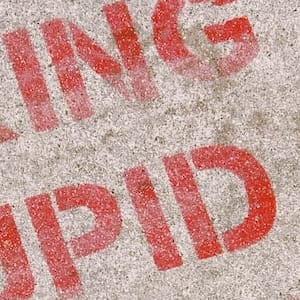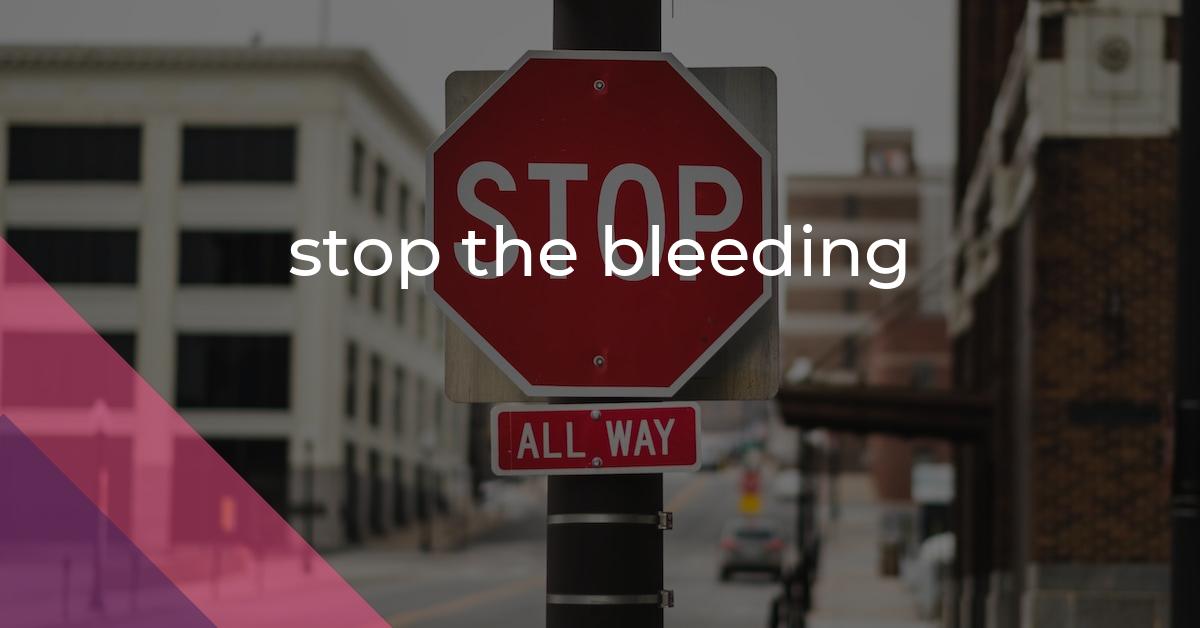stop the bleeding: Idiom Meaning and Origin
What does ‘stop the bleeding’ mean?
"Stop the bleeding" is an idiom that means to take immediate action to prevent further losses or damages, especially in a financial or organizational context.

Idiom Explorer
The idiom "the buck stops here" means taking responsibility for a situation and not passing it on to others.
The idiom "take a breather" means to stop what you are doing and take a short break to rest or relax.
The idiom "stop someone in their tracks" means to halt or interrupt someone suddenly, causing them to pause or cease their current action or thought. This expression implies a strong, unexpected impact or surprise that prevents further progress or movement.
The idiom "stop press" refers to a situation where the printing of a newspaper or magazine is momentarily halted to include late-breaking news or updates.
The idiom "stop dead" means to suddenly and completely stop moving or doing something, often due to shock, surprise, or fear.
The idiom "stop at nothing" means to be willing to do whatever it takes, without any boundaries or limits, to achieve a goal or desired outcome.
The idiom "stem the tide" means to stop or slow down the flow or progress of something, often a negative or undesirable situation.
Stem the rose means to control or stop something before it becomes a problem or gets out of hand.
The idiom "slam on the brakes" means to suddenly apply the brakes of a vehicle forcefully and abruptly to bring it to a rapid stop.
Stop the Flow
The idiom "put a stop to" is closely related to the expression "stop the bleeding." Both idioms convey the idea of taking action to halt or end a negative situation. While "stop the bleeding" emphasizes the urgency of preventing further losses or harm, "put a stop to" implies the need to bring something to an immediate halt or put an end to it altogether. This can be applied to various aspects of life, such as stopping a destructive behavior, putting an end to detrimental habits, or bringing an end to a harmful situation.
For instance, in a business context, if a company is experiencing a decline in sales, the idiom "put a stop to" can be used to highlight the importance of taking decisive actions to reverse the negative trend and prevent further financial losses. Similarly, in personal relationships, the expression can convey the significance of addressing conflicts or issues promptly to put an end to tensions and prevent them from escalating further.
Another related idiom is "stem the tide," which also shares similarities with "stop the bleeding." Just as "stop the bleeding" emphasizes the need to take immediate action to prevent further losses, "stem the tide" conveys the importance of halting the flow or progression of something negative or undesirable. In this case, the metaphorical image of a tide refers to a relentless force that can cause damage or harm if not stopped or controlled.
In a business context, the idiom "stem the tide" can be used to emphasize the need to address a declining market or industry trend head-on to prevent further repercussions. It implies the urgency of finding effective solutions to counteract the negative effects and maintain stability or growth. In personal situations, the expression can be used to convey the importance of addressing issues promptly to prevent them from worsening or causing further harm or damage to relationships or personal well-being.
Similarly, the idiom "put the brakes on" is related to "stop the bleeding." Both expressions emphasize the need to take action to slow down or halt something negative. However, while "stop the bleeding" focuses on preventing further losses or harm, "put the brakes on" refers more specifically to the act of slowing down or stopping something that is moving too fast or out of control.
In a business context, the idiom "put the brakes on" can be used to highlight the importance of exercising caution or restraint in situations where things are moving too quickly or becoming chaotic. It implies the need to slow down, reevaluate, and make necessary adjustments to prevent further damage or negative outcomes. In personal situations, the expression can be used to convey the importance of taking a step back, evaluating the situation, and making informed decisions to prevent impulsive actions or harmful consequences.
Lastly, the idiom "bleed red ink" is also related to "stop the bleeding." While "stop the bleeding" emphasizes the need to halt a negative situation or prevent further losses, "bleed red ink" specifically refers to the act of incurring financial losses or operating at a deficit. The idiom is commonly used in business contexts to describe a company or organization that is losing money consistently.
When a company is said to "bleed red ink," it means that its financial situation is deteriorating, and immediate actions are required to reverse the losses and improve profitability. This idiom can be used to emphasize the urgency of finding solutions to cut costs, increase revenue, or reevaluate the business strategy to prevent further financial decline or potential bankruptcy.
The idiom "stop the bleeding" is a powerful expression that conveys the need to take immediate action to prevent further losses or harm. The related idioms "put a stop to," "stem the tide," "put the brakes on," and "bleed red ink" all share similar meanings and can be used in different contexts to emphasize the urgency of addressing negative situations. These idioms highlight the importance of taking decisive actions, exercising caution or restraint, and finding effective solutions to prevent further damage or negative outcomes. They reflect the inherent human instinct to respond promptly and effectively to prevent the situation from worsening or causing further harm.
Example usage
Examples of how the idiom "stop the bleeding" can be used in a sentence:
1. After the company lost a major contract, they had to lay off several employees to stop the bleeding.
2. The doctor quickly patched up the wound to stop the bleeding.
3. The government implemented new policies to stop the bleeding of the struggling economy.
More "Medical" idioms



